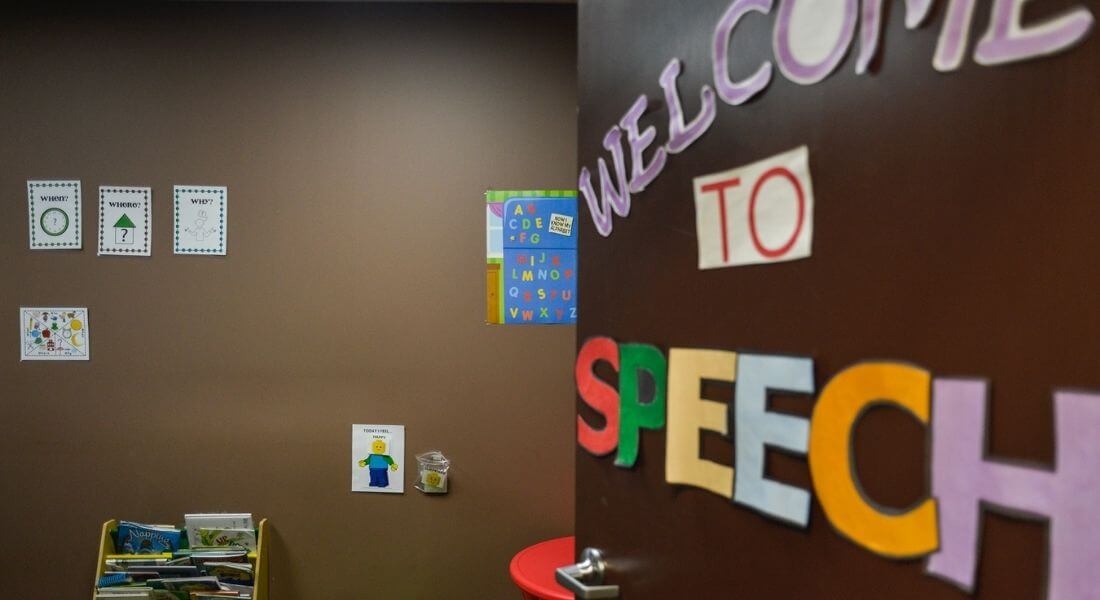When Your Child Needs a Speech Therapy Evaluation, Here’s What You Can Expect
May 23, 2022
May 23, 2022

For some families, a speech evaluation is the first step into the therapy world. From a speech delay to feeding challenges to a handful of other diagnoses or symptoms of autism, there are a range of reasons parents may choose to seek an evaluation. For other families, evaluations may be nothing new, as a child with autism may have already participated in autism testing, an ABA evaluation, or occupational therapy (OT) assessments.

Whether it’s the first step or the third, it’s natural for caregivers to wonder what they can expect during the speech evaluation, which is different than a diagnostic evaluation for autism. To give families an overview of the process, we connected with Hopebridge Speech Language Pathology Clinical Specialist Ashley Marshall. With her help, we created a guide for parents, which outlines what the evaluation entails, why it’s important, and what families can do to prepare for it.
As a parent, navigating milestones like first words, first foods and nonverbal forms of communication like eye contact, smiles and pointed fingers are not easy. Knowing if and when to seek more support and assistance with these developmental milestones can be even tougher.
“Parents should follow their gut reactions when it comes to speech and communication with their children,” said Ashley. “Even if they think talking may just be delayed or their child is just a picky eater, don’t brush it aside. It’s still a good idea to get an evaluation.”
Ashley notes that the pediatrician will often guide this conversation through a series of milestone-related questions during well child checkups. For instance, are they producing 50 words? Stringing words together? If by certain ages the answers are a hard and fast “no,” then the physician should be recommending speech therapy. Even if that is not the case and parents still have concerns in these areas, it does not hurt to seek out an evaluation anyway.

“We can dig into it and figure out whether there is something to work on with your child. Perhaps there isn’t, but we’d rather be safe than sorry and find out,” said Ashley. “Some physicians prefer to ‘wait and see’ and are hesitant to write orders for speech, but for the benefit of the child, it’s important to aim for early intervention. If this scenario applies to you, our Care and Benefits Coordinators can help get those orders in place.”
If your child experiences any of the following, you may want to consider a speech therapy evaluation:
“The majority of our referrals are regarding language, speech sound production, communication and learning, but as speech-language pathologists, our scope is broad,” said Ashley. “We are trained to intervene and provide services for essentially everything from the lungs up, which also includes respiration/breathing and feeding and swallowing, so we can provide answers to ease caregivers’ minds and support their children.”
Unlike applied behavior analysis (ABA therapy), a diagnosis for autism spectrum disorder (ASD) is not necessary prior to beginning speech therapy, but a speech evaluation is required at the start. Hopebridge provides speech therapy for children with ASD, as well as those without the diagnosis, though many parents use our centers as a one-stop-shop for complementary services like autism testing, OT, ABA and speech therapy as part of the Hopebridge 360 Care approach.*
“The evaluation and completed testing should give SLPs a comprehensive picture of what is going on with each child,” said Ashley. “It gives us time to learn the areas of concern, likes, dislikes, strengths and deficits that we need to determine how we will write the plan of care, as well as set a baseline.”
In addition to goals and treatment approach, an evaluation is important because insurance will not approve therapy without it. Speech therapists must be able to show the medical necessity based on scoring during the assessments, in addition to the parent report, in order for families to obtain insurance coverage for therapy.
A speech evaluation at Hopebridge will be scheduled with the family with help from a member of Hopebridge’s Care and Benefits Coordination team. We work to schedule these out a few weeks from when it’s requested in order to allow appropriate time for insurance authorization and paperwork.
“Hopebridge is unique in that we have a designated team that will get everything set up and ready from an insurance standpoint for our families. They will talk to physicians and get the scripts and orders. All we ask is that parents provide up-to-date information, have the patient packet completed, and be available and responsive for any questions that may arise along the way,” said Ashley. “We offer this service to make the process as smooth as possible for our families, hoping that it gives them some of their time back so they can instead focus on their child.”
In addition to the questionnaires, parents can prepare for the evaluation by jotting down any extra information that could be beneficial to share at the appointment. For example, a list of the child’s likes and dislikes can help the therapist increase engagement during the evaluation. It is also a good idea to provide details around medical history and any history of therapy in the child’s life, including contacts so we can arrange a release of information to expand upon their work or collaborate with any other providers.

Within one to two weeks of the appointment, the center will reach out to the caregivers to confirm the appointment. The speech pathologist will then either email a new patient packet, or if the child is already receiving other services from Hopebridge, a therapist may send paperwork home with the family during pickup time. These documents will include parent questionnaires to get to know more about the caregivers’ concerns.
It is important that parents and guardians fill out and return the questionnaires prior to the appointment. Not only will it give the SLP a better overview of the child from the parents’ perspective, but it will also guide what type of test we need to complete and how much time we will need to complete it.
On the day of the speech evaluation, we ask for one final thing from caregivers: please attend the appointment!
“We highly encourage parents to be present for every evaluation, even if their child already attends other therapies at Hopebridge,” said Ashley. “It is a lot easier for us to understand what is going on when we can meet with parents and see more of the interactions in person. We are always willing to schedule the appointment at a time that accommodates parents and guardians so they can be available during the evaluation.”
The reasoning is two-fold. First, having parents attend helps us obtain background information we may not be able to recognize on paper, but maybe more importantly, it helps us to see the parent’s interaction with their child.
“This first essential meeting gives us a chance to complete a good clinical review and hear from families. Parents always know their kiddos best, so we use this time to get as much information as we can from them,” said Ashley. “Plus, our SLPs are brand new people to your children, and for those not already receiving services from Hopebridge, that means a new location, new surroundings and new people. It helps for parents to be present so they can provide a calming sense to that kiddo.”

If English is not the family’s preferred language, Hopebridge has interpreters available through LUNA Language Services, who are available to support parents during the evaluation.
Within the confines of the evaluation appointment, the speech therapist will attempt to get to know the child. Our evaluations are very play-based and there are different assessments that we’ll go through. There are a variety of tools we can use, which are selected based on the referral and parent reports of the child’s needs and deficits. For instance, some assessments are better for evaluating articulation and speech sound production, others for language, and still others for swallowing. We will also use this time to ask parents to verify certain functions and concerns for the child.
Once completed, our speech pathologists will review their initial thoughts with parents, even if they do not yet have the official scores prepared, which can take more time than is allocated for the appointment. They will offer a brief overview of their thoughts as to whether they recommend speech therapy or not, as well as the “why” for each.
After the evaluation, therapists write up the plan and work with the child’s physician for their sign-off, then our Care Coordinators prepare everything for insurance providers.
It can be helpful for parents to know that there is often a short delay between the completion of the evaluation and the start date for therapy. It can take some time to receive physician sign-off on the documentation and insurance authorization. Our goal at Hopebridge is to have children begin services two weeks after the initial evaluation.

If you have questions around any areas of your child’s speech, language or feeding abilities, please reach out to us for support. Our SLPs and other clinicians want to provide answers and help your child flourish in communication and other significant areas of life. Early identification and early intervention is the best way for us to help them reach their fullest potential. Contact us here to arrange evaluation for the services that are best for your family at one of our locations around the country.
About Ashley Marshall, MS, CCC-SLP
Ashley Marshall is an ASHA certified Speech Language Pathologist with 13 years of experience for Hopebridge Autism Therapy Centers, where she also serves as the SLP Clinical Specialist responsible for clinical support, training and onboarding of speech pathologists.
Ashley specializes in Language Disorders, Dysphagia, Cognitive Disorders, Aphasia, Tracheostomies, Fluency/Voice, Communication Disorders and Child Development, among many other areas.
Ashley received a B.S. in Speech Language and Hearing Sciences from Purdue University and a M.S. in Speech Language Pathology from Indiana State University.
*Informed consent was obtained from the participants in this article. This information should not be captured and reused without express permission from Hopebridge, LLC.